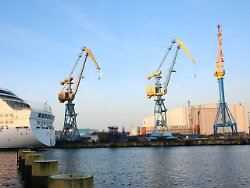The order books of German shipbuilders are still well filled. But no new orders have been added since the outbreak of the Corona crisis. The need would be great. The shipyards now want help for necessary investments.
The corona crisis has led to a drastic decrease in production at shipyards around the world and also in Germany. According to the industry service Clarkson, 22 percent fewer ships were delivered worldwide in the first half of the year, in Germany even 28 percent, announced the Association for Shipbuilding and Ocean Technology (VSM) in Hamburg. This reflects the fact that many shipyards were temporarily shut down and production was shut down. The working hours of the workforce have been greatly reduced, factory holidays have been extended and overtime has been cut.
The Corona crisis surprised the German shipyards when the order books were as full as never before. "So far, no orders have been canceled," said VSM General Manager Reinhard Lüken. This is expensive and unpopular for both the client and the shipyards. However, both sides tried to stretch the existing orders and postpone planned deliveries. As this also delays payments, the companies face additional financial problems.
"But the outlook is really dramatic," said Lüken. Since the beginning of the Corona crisis, hardly any orders for new ships have been placed worldwide, neither for cargo nor for passenger ships. "The shipowners are waiting to see how the situation in terms of consumption, production and freight volume develop and are postponing planned orders for the time being," he said.
The German shipyards, which mainly build cruise ships, ferries, luxury yachts and special ships, are particularly hard hit by the decline in orders. The flood of orders of the past few years, when the German and European shipyards developed far better than the world market, has turned into a trickle.
"But there is enough to do," said the managing director. In many market segments, the necessary investments were not made and new ships would have to be built, which would then also be more economical and more climate-friendly. As an example, Lüken named the fleet of Greek ferries, which regularly fail safety tests and are only allowed to travel with special permits. Most inland waterways in Germany have also been in service for 60 years.
In order for the shipping companies to invest, they would have to receive state support. "There is a need, but no market," said Lüken. The German shipyards are hoping for the billion-dollar European and German Corona programs, which are also intended to promote climate-friendly measures. In the first phase of the pandemic, German politics had achieved great things. The second part, the structural adjustment, will be even more difficult, said Lüken.
MV shipyards in need
Just recently, Mecklenburg-Western Pomerania confirmed that because of the parent company of MV Werften, Genting, the state government wants to get the domestic production facilities under the federal rescue package. "Everyone involved is working intensively on this," said the Ministry of Economics and Finance. According to reports, an application for federal aid has already been submitted. The Hong Kong-based parent company MV-Werften recently announced that it would temporarily suspend all payments to creditors and banks because it had lost its income from the cruise business – a core business of the company.
With the help of the Federal Economic Stabilization Fund, the financing of the billion dollar new ships for the Asian cruise market is now to be secured. The MV Werften hope for 570 million euros. The country had already increased its guarantee framework. The multi-group Genting took over the shipyards in Wismar, Rostock and Stralsund in 2016 in order to have cruise ships built there for their own needs. The orders placed reached far into the future and promised secure jobs for a total of 3,100 employees. However, as a result of the corona pandemic and a lack of income, work at the shipyards was stopped in March. Short-time working was requested by the end of the year.
. (tagsToTranslate) Economy (t) Shipyards (t) Corona crisis (t) State aid
